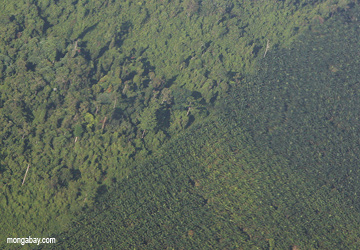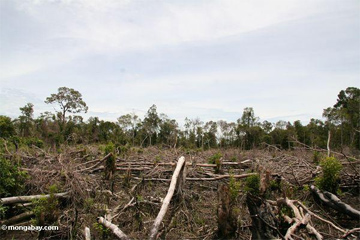Competing groups misrepresent facts to the detriment of the wider public.
This paper summarized below ties into New strategies for conserving tropical forests (2008).
Misinformation campaigns by both corporations and environmental groups threaten to undermine efforts to conserve biodiversity and reduce environmental degradation, argues a new paper published in the journal Biotropica.
Growing concerns over climate change and unsustainable resource extraction have put companies that exploit the environment in the spotlight. Some firms have responded by taking measures to reduce their environmental impact. Others have alternatively engaged in sophisticated marketing campaigns intended to mislead consumers on their environmental performance, maintaining that environmentally-destructive practices are instead benign.
|
|
At the same time some activist groups have been guilty of exaggerating claims of environmental misconduct in order to boost support for their campaigns and therefore their fundraising efforts.
We (I am one of seven co-authors) argue that both approaches ultimately “hinder conservation outcomes through the erosion of positive public perception and the creation of consumer apathy.”
The current debate over the environmental impact of palm oil is a prime example. At one extreme, palm oil marketing bodies like the Malaysian Palm Oil Council (MPOC) and the Indonesian Palm Oil Association (GAPKI) would have consumers believe that palm oil is a “miracle crop” that delivers only benefits and no harms (like carbon emissions and deforestation). At the other, some environmental groups assert that oil palm expansion will drive the immediate extinction of orangutans (as soon as 2011), a claim which cannot be substantiated scientifically (orangutans are indeed threatened by oil palm expansion, among other practices like logging, but with a wild population exceeding 50,000 they are unlikely to extinct within the next two years).
We argue that it is the responsibility of scientists to critically assess claims by both sides to ensure that an accurate picture emerges:
-
The same degree of accountability and transparency demanded from the oil palm industry should also be expected from environmental groups, who are self-declared monitors of the industry. It is in the interest of such groups to invest more caution in verifying their own statements before public distribution. Factually dubious information advanced as truth by activists could provide ammunition for trade groups to dismiss environmental concerns altogether, or for naysayers to dispute their claims (e.g., Lomborg 2001, 2007). Most importantly, such blackwashing could undermine the trust invested by consumers in the certification process for sustainable palm oil specifically and other certified products more generally, and by extension, the environmental and social benefits that could otherwise be achieved…

Oil palm plantation and logged-over forest in Borneo. |
The continued growth of the global population and societal wealth
ensures that demand for agricultural and industrial products will
continue to increase. We cannot conceive of a credible way to meet
these demands without large-scale and often intensive agriculture…
Accepting this,
corporations and large-scale agricultural estates make a necessary
contribution to societal needs, which we must recognize as being
the product of our own consumer behavior (including what, how
much, and what price of products we choose to consume).
At the same time, our concerns for the environment—and, in
our case, tropical forests in particular—demand that we balance our
needs for consumer products with the environmental degradation this
might entail. We need environmental activists to pressure corporations
to minimize their environmental impacts. We also need
environmental activists to hold companies to account for any mismanagement
and misrepresentation, deliberate or otherwise. To a
great extent we (as general public) rely on pressure groups to expose
malpractices, and it is precisely for this reason that these groups
should strive to maintain the highest standards of reporting. Trust in
these organizations begins to be undermined when this is not the case…
We need both corporations and environmental
groups: we need to convince the former that we will
hold them to account, and we need to trust the latter to advance
these efforts for us responsibly.
Lian Pin Koh, Jaboury Ghazoul, Rhett A. Butler, William F. Laurance, Navjot S. Sodhi, Javier Mateo-Vega, and Corey J. A. Bradshaw. Wash and Spin Cycle Threats to Tropical Biodiversity. BIOTROPICA: 1–5 2009 10.1111/j.1744-7429.2009.00588.x
Related articles
Palm oil lobby group launches public relations push to counter environmental complaints
(11/02/2009) A report released by World Growth International in late September claimed that environmentalists are waging a “morally indefensible” campaign against palm oil. The report accurately highlighted the high productivity of oil palm — the world’s highest-yielding commercial oilseed — and noted that the crop has created jobs and driven rural development in Malaysia and Indonesia. Critically, World Growth also downplayed chief concerns about the rapid expansion of oil palm cultivation across southeast Asia, notably worries that palm oil production is contributing to deforestation, putting endangered wildlife like the orangutan at risk, and adversely affecting climate. To make its case, the report made some questionable claims, asserting that oil palm plantations sequester more carbon than natural forests and that deforestation is driven by poverty rather than industrial activities.
Britain bans palm oil ad campaign
(09/09/2009) Britain’s Advertising Standards Authority (ASA), a group that regulates advertisements, has again banned “misleading” ads by the palm oil industry, reports the Guardian. ASA ruled that a campaign run by the Malaysian Palm Oil Council (MPOC) makes dubious claims, including that palm oil is the “only product able to sustainably and efficiently meet a larger portion of the world’s increasing demand for oil crop-based consumer goods, foodstuffs and biofuels.” The ad said criticism over “rampant deforestation and unsound environmental practices” were part of “protectionist agendas” not based on scientific fact. ASA held the ad breached several of its advertising standards codes, including “substantiation,” “truthfulness,” and “environmental claims.” In rebuking the MPOC, the ASA said that the merits of new eco-certification scheme promoted by the palm oil industry is “still the subject of debate” and that the ad’s attacks on detractors implied that all criticisms of the palm oil industry “were without a valid or scientific basis.”
Corporations become prime driver of deforestation, providing clear target for environmentalists
(08/05/2008) The major drivers of tropical deforestation have changed in recent decades. According to a forthcoming article, deforestation has shifted from poverty-driven subsistence farming to major corporations razing forests for large-scale projects in mining, logging, oil and gas development, and agriculture. While this change makes many scientists and conservationists uneasy, it may allow for more effective action against deforestation. Rhett A. Butler of Mongabay.com, a leading environmental science website focusing on tropical forests, and William F. Laurance of the Smithsonian Tropical Research Institute in Panama believe that the shift to deforestation by large corporations gives environmentalists and concerned governments a clear, identifiable target that may prove more responsive to environmental concerns.









